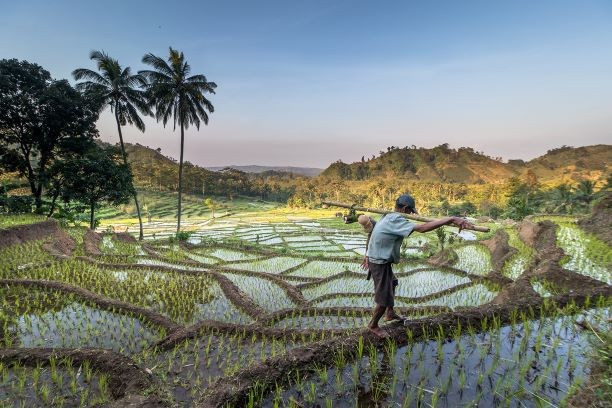News
70,000 Red-White village cooperatives may overlap with BUMDes
Tenggara Strategics March 22, 2025 Heading home: A farmer walks among rice fields in Brebes regency, Central Java. (Courtesy of Marius Moragues/-)
Heading home: A farmer walks among rice fields in Brebes regency, Central Java. (Courtesy of Marius Moragues/-)
The government plans to establish 70,000 Red and White village cooperatives at an estimated cost of Rp 350 trillion (US$21.47 billion), with the official launch set for July 12, coinciding with National Cooperatives Day. This initiative aims to strengthen rural economies and tackle key challenges such as extreme poverty by improving access to staple goods. However, concerns have been raised about the project’s feasibility and the potential redundancy it may create alongside existing village-owned enterprises (BUMDes).
The Red and White Cabinet approved this strategic policy during a closed-door meeting at the State Palace on March 3. To achieve the target of 70,000 cooperatives, the government plans to establish new ones, revitalize struggling cooperatives and expand existing ones. However, this ambitious effort comes at a significant financial cost. According to Home Affairs Minister Tito Karnavian, each cooperative requires Rp 5 billion in capital to support local economic activities, translating to a total budget of Rp 350 trillion.
Experts warn that the proposed cooperatives may overlap with the existing role of BUMDes, urging the government to assess current policies before introducing new initiatives. The concern is that this program may repeat past efforts rather than offering a genuinely innovative solution. Similar initiatives, such as the village unit cooperatives (KUD) and BUMDes, have faced challenges in achieving long-term sustainability.
The KUD, introduced in 1978, was designed to promote food self-sufficiency but declined in effectiveness after the 1998 Reform era due to unclear policies, weak governance and reduced government support. In contrast, BUMDes, introduced under Law No. 6/2014 on villages during president Susilo Bambang Yudhoyono’s administration, provided villages with greater flexibility to manage business units, including cooperatives. Despite a decade of implementation, however, BUMDes remains in its growth phase, with only a few enterprises achieving national prominence.
The Red and White village cooperative is envisioned as an integrated rural development initiative aimed at strengthening community resilience. It will provide essential services such as retail outlets for staple goods, affordable medicine, village pharmacies, financial services and logistical support through cold storage and distribution networks. By offering these services, the cooperative seeks to reduce dependence on illegal online lenders, middlemen and loan sharks.
Additionally, Cooperatives Minister Budi Arie Setiadi highlights the cooperatives’ role in President Prabowo’s free nutritious meal program. These cooperatives will serve as primary distributors of raw materials, aligning with the president’s directive for cooperatives and village-owned enterprises to support the program while stimulating rural economies.
To ensure financial sustainability, the Red and White village cooperative initiative will be backed by a financial plan developed through collaboration between the State-Owned Enterprises (SOEs) Ministry, the Finance Ministry and the State-Owned Banks Association (Himbara). The program’s initial funding will come from loans sourced through the state budget (APBN), regional budgets, village funds and BUMDes, with repayment scheduled once the cooperatives become operational. Recognizing the differences in village fund allocations, the government is also facilitating access to additional financing options through Himbara.

